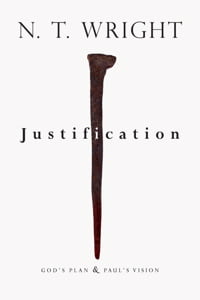In his Justification: God’s Plan and Paul’s Vision, N. T. Wright reflects:
It is really high time we developed a Christian ethic of blogging. Bad temper is bad temper even in the apparent privacy of your own hard drive, and harsh and unjust words, when released into the wild, rampage around and do real damage. . . . [T]he cyberspace equivalents of road rage don’t happen by accident. People who type vicious, angry, slanderous and inaccurate accusations do so because they feel their worldview to be under attack. Yes, I have a pastoral concern for such people. (And, for that matter, a pastoral concern for anyone who spends more than a few minutes a day taking part in blogsite discussions, especially when they all use code names: was it for this that the creator God made human beings?) (Wright 26–27; cf. Köstenberger, “Internet Ettiquette”; Köstenberger, “Internet Ettiquette, Part 2”).1
This bow shot at “(information) superhighway rage” is, of course, quite fitting, as is the recognition that, for all its usefulness in certain areas (e.g., facilitating information exchange), the internet itself often poorly facilitates other things (e.g., sustained content quality control; on a slightly different facet of the issue, see Goodacre, “April Fool’s Jokes”). Such things are clearly in the forefront of Wright’s mind in the quoted statements and may help to flesh out the role of biblioblogging in relation to presentations in more traditional media. For instance, consider the following quotation:
Today in the sciences, books are usually either texts or retrospective reflections upon one aspect or another of the scientific life. The scientist who writes one is more likely to find his professional reputation impaired than enhanced. Only in the earlier, pre-paradigm, stages of the development of the various sciences did the book ordinarily possess the same relation to professional achievement that it still retains in other creative fields. And only in those fields that still retain the book, with or without the article, as a vehicle for research communication are the lines of professionalization still so loosely drawn that the layman may hope to follow progress by reading the practitioners’ original reports (Kuhn 20; italics and bold added).
Biblical studies certainly “retain[s] the book” in such a fashion, and biblioblogs can have a similar function, even if how they fit among more traditional, academic activities is not always clear (cf. Goodacre, “Academic Blogging”; Carlson). Although internet access is not always free, subscriptions to blogs are as free as RSS readers, and as internet access and use of blog subscriptions continue becoming more common, the quantity of people interested in biblioblog material at its regular cost (i.e., free), should continue growing also. Consequently, this increase in the accessibility of material related to biblical studies could continue significantly widening at least the circle of listeners for biblical studies discussions (if not the circle of participants in these discussions also), but whether this increase in accessibility will be beneficial is entirely relative to the value of the content on the biblioblogs themselves. As biblioblog quality approaches the quality that has come to be expected in more traditional media, the blog medium itself becomes something quite different from the “blog as site for spuriousness” that Wright so correctly criticizes—it becomes something more akin to Thomas Kuhn’s “vehicle for research communication.” Since the sciences about which Kuhn was writing and the general humanities setting in which biblical studies and biblioblogging sit have different dissemination media and subject matter, however, several additional and potentially beneficial options emerge for forms that biblioblogs and their contents might take (see Köstenberger, “Genre of ‘Blog’”). How precisely to sustain this kind of interchange where it does exist and how to encourage it where it should exist are thorny questions indeed, and in some cases, behavioral regeneracy may be a necessary starting point (cf. Col 3:7–8).
Yet, in addition, might not self-consciously situating biblioblogging in some kind of “Great Conversation” among present students, past students, and the biblical literature itself provide a measure of guidance? With the current nature of the blog medium, this conversation will certainly be impersonal—a conversation among “gravatars” is certainly not the same as a conversation among “real” people present with each other at the same time (cf. Wright 27). Yet, on the other hand, the letters and signatures that have connected people for centuries are, for instance, at least in some ways, not so very different from blogs and gravatars.
The metaphor of biblioblogging, within a “Great Conversation,” as a “working group” is probably too formal and scholastic, but it does portray the activity as a collaboration that produces something beneficial. Thanks to resources like those that Brandon Wason and John Hobbins, Daniel and Tonya, and perhaps most particularly, the Biblioblog Top 50 (with its accompanying Google searches of all biblioblogs and all biblioblogs and related blogs), “beneficial somethings” on the biblioblogs are continuing to become easier to find by more people, once these “somethings” are added to the conversation in any given place. With the rise of resources like these ones and a push (whether from individual bibliobloggers or from a more organized, “peer review” format) to maintain good content quality, biblioblogging should be able to be a valuable activity for bloggers and readers. Indeed, not least for those of us in the Protestant tradition, whose first forebears regularly pushed to get more people more information with which to make more informed decisions about matters of biblical interpretation, the blog medium has, despite some of its deficiencies, the attractive potential to serve simultaneously both church and academy, as well as any others who “log on.”
1 Incidentally, InterVarsity has made the chapter from which this quote comes available in a PDFon their website.
In this post:
 |
|

Leave a Reply